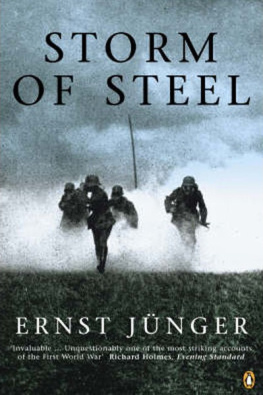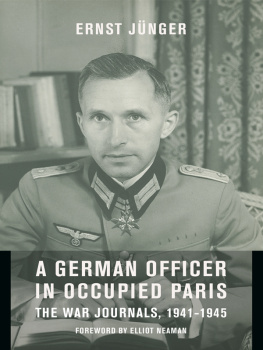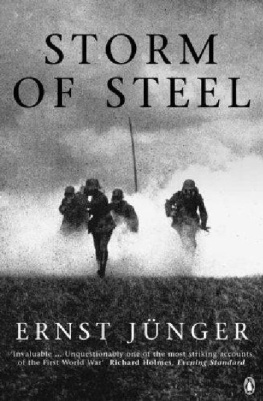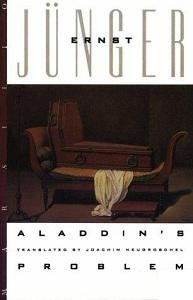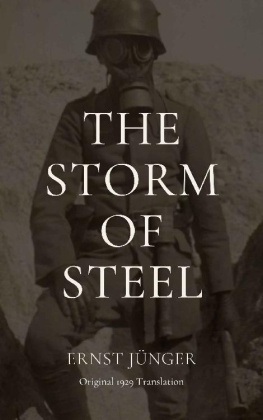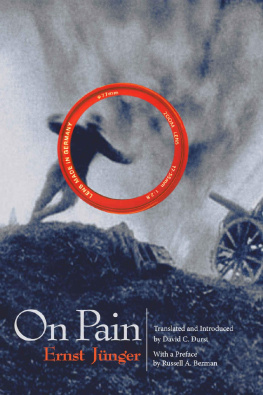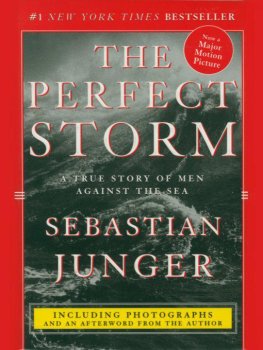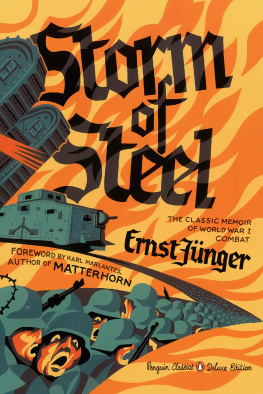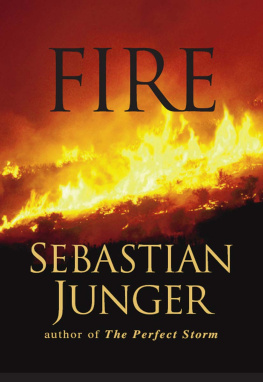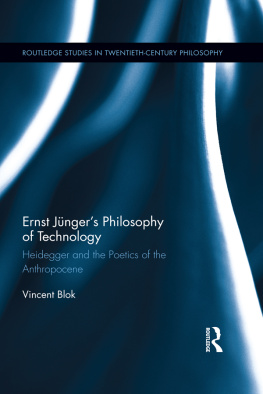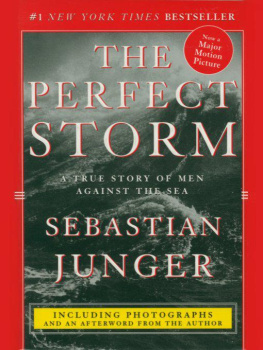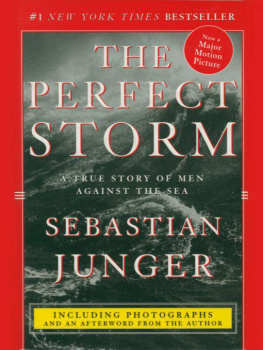Ernst Jünger - Storm of Steel
Here you can read online Ernst Jünger - Storm of Steel full text of the book (entire story) in english for free. Download pdf and epub, get meaning, cover and reviews about this ebook. year: 2004, publisher: Penguin, genre: Non-fiction. Description of the work, (preface) as well as reviews are available. Best literature library LitArk.com created for fans of good reading and offers a wide selection of genres:
Romance novel
Science fiction
Adventure
Detective
Science
History
Home and family
Prose
Art
Politics
Computer
Non-fiction
Religion
Business
Children
Humor
Choose a favorite category and find really read worthwhile books. Enjoy immersion in the world of imagination, feel the emotions of the characters or learn something new for yourself, make an fascinating discovery.
- Book:Storm of Steel
- Author:
- Publisher:Penguin
- Genre:
- Year:2004
- Rating:5 / 5
- Favourites:Add to favourites
- Your mark:
- 100
- 1
- 2
- 3
- 4
- 5
Storm of Steel: summary, description and annotation
We offer to read an annotation, description, summary or preface (depends on what the author of the book "Storm of Steel" wrote himself). If you haven't found the necessary information about the book — write in the comments, we will try to find it.
Storm of Steel — read online for free the complete book (whole text) full work
Below is the text of the book, divided by pages. System saving the place of the last page read, allows you to conveniently read the book "Storm of Steel" online for free, without having to search again every time where you left off. Put a bookmark, and you can go to the page where you finished reading at any time.
Font size:
Interval:
Bookmark:
Ernst Junger
Storm of Steel
Translated with an Introduction by
MICHAEL HOFMANN
STORM OF STEEL
Ernst Junger was born in Heidelberg in 1895. He ran away from school to enlist in the Foreign Legion and in 1914 volunteered to join the German army. He fought throughout the war and recorded his experiences in several books, most famously in In Stahlgewittern (Storm of Steel). While admired by the Nazis, he remained critical of them and through novels such as On the Marble Cliffs (1939) sought to understand the impasse into which Germany was heading. Throughout the Nazi period he was a controversial inner emigrant, distanced from the regime yet only obliquely in opposition. His most famous later books include Heliopolis (1949), The Glass Bees (1957), Eumeswil (1977), Aladdin's Problem (1983), and A Dangerous Encounter (1985). He died in 1998.
Michael Hofmann has translated Joseph Roth, Herta Muller, Zoe Jenny, Wim Wenders, Wolfgang Koeppen, and Franz Kafka. His own books include Corona, Corona and Behind the Lines. He also coedited, with James Ladun, After Ovid.
To request Penguin Readers Guides by mail
(while supplies last), please call (800) 778-6425
or e-mail reading@us.penguingroup.com.
To access Penguin Readers Guides online,
visit our Web site at www.penguin.com.
PENGUIN BOOKS
Published by the Penguin Group
Penguin Group (USA) Inc., 375 Hudson Street, New York, New York 10014, U.S.A.
Penguin Books Ltd, 80 Strand, London WC2R ORL, England
Penguin Books Australia Ltd, 250 Camberwell Road, Camberwell, Victoria 3124, Australia
Penguin Books Canada Ltd, 10 Alcorn Avenue, Toronto, Ontario, Canada M4V 3B2
Penguin Books India (P) Ltd, 11 Community Centre, Panchsheel Park, New Delhi 110 017, India
Penguin Books (HZ.) Ltd, Cnr Rosedale and Airborne Roads, Albany, Auckland, New Zealand
Penguin Books (South Africa) (Pty) Ltd, 24 Sturdee Avenue, Rosebank, Johannesburg 2196, South Africa
Penguin Books Ltd, Registered Offices: 80 Strand, London WC2R ORL, England
In Stahlgewitten first published in german 1920
This final revised edition first published 1961
This translation made from the edition prepared from the Saemtliche Werke, vol. I: Der Erste Weltkrieg. Klett-Cotta, Stuttgart, 1978
This translation first published in Great Britain by Allen Lane, an imprint of Pengin Books 2003
Published in Penguin Books 2004
13579 10 8642
Copyright 1920, 1961 J. G. Cotta'sche Buchhandlung Nachfolger GmbH, Stuttgart
Introduction and translation copyright Michael Hofmann, 2003
All rights reserved
LIBRARY OF CONGRESS CATALOGING IN PUBLICATION DATA
Junger, Ernst, 1895-1998
[In Stahlgewittern. English]
Storm of Steel / Ernst Junger ; translated by Michael Hoffman
p. cm.
ISBN 0 14 24.3790 5
1. Unger, Ernst, 1895-1998.
2. World War, 1914-1918 Personal narratives, German.
3. Soldiers-Germany Diaries. I. Hofmann, Michael, 1957 Aug. 25-II. Title.
D640.J69313 2004
940.4'144'092dc22
[B] 2004044331
Printed in the United States of America Set in Sabon
Except in the United States of America, this book is sold subject to the condition that it shall not, by way of trade or otherwise, be lent, re-sold, hired out, or otherwise circulated without the publisher's prior consent in any form of binding or cover other than that in which it is published and without a similar condition including this condition being imposed on the subsequent purchaser. The scanning, uploading and distribution of this book via the Internet or via any other means without the permission of the publisher is illegal and punishable by law. Please purchase only authorized electronic editions, and do not participate in or encourage electronic piracy of copyrighted materials. Your support of the author's rights is appreciated.
Contents
Storm of Steel
In the Chalk Trenches of Champagne
From Bazancourt to Hattonchatel
Les Eparges
Douchy and Monchy
Daily Life in the Trenches
The Beginning of the Battle of the Somme
Guillemont
The Woods of St-Pierre-Vaast
Retreat from the Somme
In the Village of Fresnoy
Against Indian Opposition
Langemarck
Regnieville
Flanders Again
The Double Battle of Cambrai
At the Cojeul River
The Great Battle
British Gains
My Last Assault
We Fight Our Way Through
Storm of Steel (In Stahlgewittern is the original title) is one of the great books of World War I, if not the greatest. All sorts of trustworthy and unlikely people and trustworthy often precisely because unlikely: cosmopolites, left-wingers, non-combatants have stepped up to express their admiration, often in suitably embarrassed or bemused fashion: Boll and Borges, Enzensberger and Brecht, Gide and Moravia. In 1942, Gide wrote in his diary: 'Ernst Junger's book on the 1914 War, Storm of Steel, is without question the finest book on war that I know: utterly honest, truthful, in good faith.'
Its contrast with most of the others is stark. It has no pacifist design. It makes no personal appeal. It is a notably unconstructed book. It does not set its author and his experience in any sort of context. It offers nothing in the way of hows and whys, it is pure where and when and of course, above all, what. There is nothing in it about the politics of the war nothing even on its outcome and very little on the wider strategy of its conduct. It begins the moment Private Ernst Junger first detrains in France, on 27 December 1914, at the age of nineteen, with (though we aren't told this) a rushed school-leaving certificate and a couple of months' training behind him, having volunteered on 1 August, the opening day of the war. (It is hard to imagine an English autobiographer or belletrist a Graves or a Sassoon, amateur and holistic wouldn't have included that, or indeed the fact that the year before, as a bored romantic youth full of wanderlust, he had run away to Algeria to join the French Foreign Legion!) It ends, in one of a bare handful of scenes that are away from the action, back in Germany four years later, when he is too badly hurt to carry on, a decorated lieutenant and the youngest-ever recipient of the pour le Merite. War is all fighting is all everything else is cropped away. And, from first to last, in the affirmative. It is the work of a man whom the war made and who, in World War II, was to be again a professional soldier. It was published long before the likes of Blunden, Graves, Remarque and Sassoon, all of which appeared in the late 1920s, at a classic ten-year distance from the events they describe, giving their public and themselves time to recover; only Barbusse's novel Le Feu (Under Fire), from 1917, came out much before Ernst Junger's account was first privately printed with a local firm (the family gardener, Robert Meier, was designated as the 'publisher') in 1920, at the instigation of Junger's father. The impressively cumbersome original title was In Storms of Steel: from the Diary of a Shock Troop Commander, Ernst Junger, War Volunteer, and subsequently Lieutenant in the Rifle Regiment of Prince Albrecht of Prussia (73rd Hanoverian Regiment).
The initial print-run was 2,000, the intended readership presumably members of the regiment and other veterans, and the work, in literary terms, was undistinguished and at times, apparently hardly a surprise, considering its author's repeated rush to get out of school 'even fell short of the required standard for a sixth-form essay'. The 'diary' element, though never entirely suppressed later, was initially mostly all there was, closely following the sixteen notebooks Junger filled during the war. The book steadily sold through its small printings, but it wasn't the instant bestseller it is sometimes thought to have been. Junger was recruited by Mittler & Son, a noted publisher of militaria in Berlin, and wrote more books on the war, including the viscerally as well as headily unpleasant treatise On Battle as an Inner Experience (1922) of which I could not bring myself to read more than the excerpts I read years ago in a book on German history and a couple of spin-offs covering material from Storm of Steel in a more lingering and opinionated way: Copse 125 (1925) and Fire and Blood (1925). A shot at a novel, Sturm after one of the characters, nomen est omen was abandoned after a few installments. In the mid 1920s, then, Junger was already a prolific and established war writer before such a thing really existed. (His first non-war book, a memoir of his childhood, didn't appear until 1929.) Even so, acute observers were afraid they might lose Junger the soldier to literature. On balance, I suppose, that's what happened, but it's a close call. Junger has remained as much identified with World War I or war in general as with writing. I forget who it was who said they couldn't picture Junger the author at all except in uniform.
Font size:
Interval:
Bookmark:
Similar books «Storm of Steel»
Look at similar books to Storm of Steel. We have selected literature similar in name and meaning in the hope of providing readers with more options to find new, interesting, not yet read works.
Discussion, reviews of the book Storm of Steel and just readers' own opinions. Leave your comments, write what you think about the work, its meaning or the main characters. Specify what exactly you liked and what you didn't like, and why you think so.

